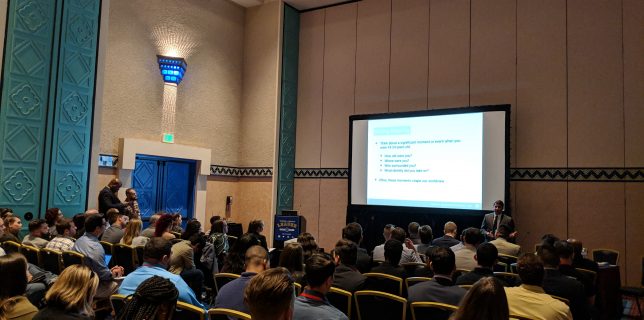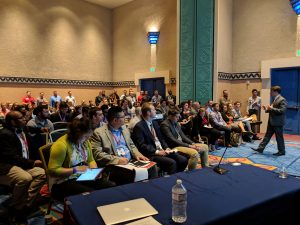A blog post from SOLES PhD in Leadership Studies Ambassador, Derek Abbey.
Presenting your work at professional and academic conferences is beneficial for a variety of reasons. As I have progressed through the PhD in Leadership Studies program at SOLES, I have made efforts to present at as many conferences as possible. These efforts have paid off significantly.
Why should a doctoral student seek out presentation opportunities?
There is a long list of reasons why getting yourself on the speaking circuit is valuable. Some of them are listed below:
1. Adds breadth and depth to your knowledge of the research topic.
2. Improves your speaking and presentation skills.
3. Learn what people value in your community.
4. Adds to your resume/CV. Poster presentations should be included on your resume/CV. For many, a poster presentation will be the initial opportunity to present.
5. Receive feedback on your research and determine how much interest there is in the topic you are exploring.
6. Build your network and reputation.
7. Discover future employment opportunities.
How do you do it?
1. Identify the conferences that align with the research you are conducting. You can build this list by asking professionals working in the areas you are interested in. Sign up for their distribution list in order to receive updates.
2. Once your list is built, build a timeline of when and where these conferences are taking place. Examine this timeline to determine your ability to attend the conferences.
3. If you can, attend the conference first to get a feel for what the focus is and what the presentations are like.
4. Review when proposals are due for the conferences and what they consist of.
5. Submit your proposal(s).
6. When your proposal is approved, prepare and give your presentation
Concerns!
How are you going to pay for this? Traveling to and attending a conference can be expensive. Most conferences expect you to register, even if you are only there to present. If you are concerned about cost there are a few things you can do., First, determine if there are resources at the university to support you and apply for them. Additionally, if the conference aligns with your professional life, there may be resources available along professional development lines. Lastly, ask the conference for a discount or to waive fees.
You don’t have to do this alone. If public speaking is your greatest fear, partner with someone with similar interests. You may discover that a group project you worked on in class would make a great presentation. Additionally, classmates and professors may be willing to work with you on a project. Professors already have a reputation in the community, so this may increase the likelihood of your proposal being accepted.
The presentations that I have given while a doctoral student have resulted in all of the benefits listed in the “why” section above. My professional reputation has grown across the nation and ultimately it has resulted in my post-doctoral employment. Additionally, I now receive invitations to speak or be on panels because of this work. Most of the time, the work that I was conducting for my classes turned into presentations and speaking opportunities across the nation. If this is the case, most of the hard work is done.
Now get out there and start talking about the amazing work you are doing!



